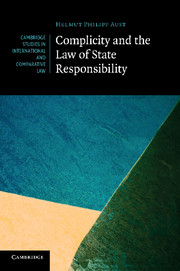Book contents
- Frontmatter
- Contents
- Foreword
- Preface
- Table of cases
- Abbreviations
- 1 Introduction
- 2 Complicity between bilateralism and community interest
- 3 Complicity and the international rule of law
- 4 Complicity in customary international law
- 5 The concept of complicity in Article 16 ASR
- 6 The consequences of complicity
- 7 Complicity and aggravated responsibility
- 8 A network of rules on complicity
- General conclusions
- Bibliography
- Index
6 - The consequences of complicity
Published online by Cambridge University Press: 07 September 2011
- Frontmatter
- Contents
- Foreword
- Preface
- Table of cases
- Abbreviations
- 1 Introduction
- 2 Complicity between bilateralism and community interest
- 3 Complicity and the international rule of law
- 4 Complicity in customary international law
- 5 The concept of complicity in Article 16 ASR
- 6 The consequences of complicity
- 7 Complicity and aggravated responsibility
- 8 A network of rules on complicity
- General conclusions
- Bibliography
- Index
Summary
At least as pressing as the determination of when a State incurs responsibility for aid or assistance to an internationally wrongful act of another State is the question of what consequences flow from this assessment. In this respect, two distinct but interrelated issues can be identified. First of all, it needs to be clarified what the consequences of complicity are in terms of the law of State responsibility. This involves an examination of the content as well as the implementation of responsibility in a situation where there are multiple responsible actors (section 1). Secondly, uncertainties as to the consequences of complicity exist with respect to judicial dispute settlement. To hold a complicit State responsible necessarily implies a finding on the conduct of another State, i.e. the State to which aid or assistance has been rendered. Due to some procedural peculiarities before international courts and tribunals, it could prove to be difficult to hold a complicit State responsible in international judicial forums (section 2).
The content and implementation of responsibility for complicity
On the face of it, the usual consequences in terms of content and implementation for responsibility apply for complicit States. That means that content-wise Articles 28–41 ASR apply as well as Articles 42–54 implementation-wise. However, it needs to be borne in mind that these consequences have been largely modelled on the bilateral relation between one wrongdoing State and one injured State.The additional presence of a third State is thus likely to complicate the situation. Accordingly, this section will assess whether and to what extent the rules laid down in Articles 28–41 and 42–54 are fit to determine the consequences of complicity. When the content and implementation of responsibility is at stake, it should be understood that these general rules address a large array of fairly diverse cases. Breaches of international law may involve anything from the trivial to the serious breach of peremptory norms. Accordingly, the application of the rules on content and implementation of responsibility may be adapted due to the seriousness of the breach. In general, however, the consequences which the ILC has codified in the ASR apply without modification.
- Type
- Chapter
- Information
- Complicity and the Law of State Responsibility , pp. 269 - 318Publisher: Cambridge University PressPrint publication year: 2011



